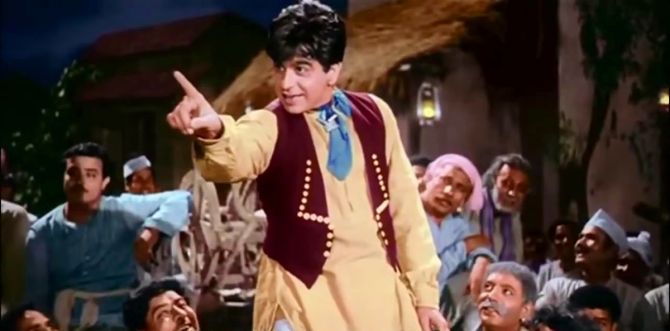
4 important takeaways from Dilip Kumar's life and career:
1. You can carve your own path to success
Dilip Kumar didn't belong to a film background. His father was a fruit merchant.
It was Devika Rani, tbe legendary actress and co-owner of Bombay Talkies, who spotted and introduced him to the world of cinema.
In the early years of his career, Dilip Kumar spent a lot of time observing and learning from other actors like Ashok Kumar until he found his niche.
Although his initial films didn't do too well, he held his own and continued to work hard.
Three years after his debut, his fourth film Jugnu (1947) became his first hit. And eight years after his debut, he won the first ever Filmfare award (given in 1954) for his portrayal of Shankar in the 1952 film Daag.
Over the years, he won the award seven more times (a record later equalled by Shah Rukh Khan).
Dilip Kumar remains an inspiring example of how one can build a career from scratch, fuelled purely by passion and hard work.
He did not give into the frustration of failure or lack of recognition and continued working hard. His story of struggle and success is a lesson in how one can reach the pinnacle in one's career and life.
2. Quality over quantity
Dilip Kumar marked his debut with Jwar Bhata in 1944. His last film Qila was released in 1998.
In a career spanning five decades, he acted in just 65 films.
A much sought after star and -- with Raj Kapoor and Dev Anand -- part of Bollywood's legendary golden troika, he continued to remain choosy about the films he worked in, often rejecting roles or characters he felt was inappropriate.
He refused the role of Sherif Ali ibn el Kharish -- later played by Omar Sharif -- in David Lean's Lawrence Of Arabia, which could have propelled him to international stardom.
His choice of films clearly defined his personality and individuality, and how much he respected his craft.
While some of his films tanked at the box office, he also gave us many landmark movies like Mughal-e-Azam, Naya Daur and Devdas that have stood the test of time.
3. Patience and professionalism
One of the actor's greatest contributions to Hindi cinema is Mughal-e-Azam.
Did you know it took almost a decade to make the film?
In these years, the actors and makers went through a continuous phase of struggle, delays, disappointments and conflicts.
To begin with, Dilip Kumar wasn't convinced about working in a period drama and playing Prince Salim.
Then, he had difficulty shooting in the heavy costumes in the hot climate of Rajasthan.
His relationship with co-star and former love interest Madhubala had deteriorated to such an extent that two were barely speaking to each other.
Yet, Dilip Kumar rarely let his personal conflicts or professional discomfort affect his performance or his movies. Despite the problems, Mughal-e-Azam was completed and went on to become of the brightest stars in the Indian cinematic firmament.
This is one reason why people continue to hail the actor for his patience and determination to succeed despite the odds.
4. Adapt to stay relevant
Dilip Kumar changed himself as an actor over the years.
From a successful 'tragedy king' who was adept at drama, he took a major risk in the 1960s by taking on comic roles. His effort paid off brilliantly in Ram Aur Shyam.
Instead of getting typecast by doing similar roles and sticking to a particular genre, he did versatile characters, shifting from drama and romance to comedy and lighter characters.
In the eighties, he once again adapted to tastes of cinema goers doing socially relevant films like Kranti, Shakti, Karma and Mashaal, which presented him in a new light.
In the words of another legend, Amitabh Bachchan, 'Whenever the history of Indian cinema will be written, it shall always be 'before Dilip Kumar, and after Dilip Kumar'.'










